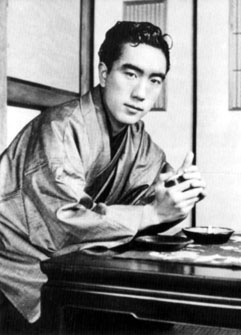| Yukio Mishima  AKA Hiraoka Kimitake AKA Hiraoka Kimitake
Born: 14-Jan-1925
Birthplace: Tokyo, Japan
Died: 25-Nov-1970
Location of death: Tokyo, Japan
Cause of death: Suicide
Remains: Buried, Tama Reien Cemetery, Tokyo, Japan
Gender: Male
Religion: Buddhist
Race or Ethnicity: Asian
Sexual orientation: Bisexual
Occupation: Author Nationality: Japan
Executive summary: The Sea of Fertility Military service: Japan Ground Self Defence Force (1967-70) Trained with the Japanese GSDF in 1967. A year later he formed the Shield Society for patriotic young students in the GSDF who were interested in reviving samurai principles. On 25 November 1970 Mishima and four members of the society took the commandant of the Tokyo GSDF base and attempted to rally the soldiers to a coup d'etat. When this failed, Mishima and his lover committed seppuku -- ritual self-disembowelment -- and were beheaded. Father: Azusa Hiroaka
Mother: Shizue Hiroaka
Brother: Chiyuki (b. 19-Jan-1930)
Sister: (d. 23-Oct-1945, typhus)
Wife: Yoko Sugiyama (m. 11-Jun-1958)
Daughter: Noriko (b. 2-Jun-1959)
Son: Iichiro (b. 2-May-1962)
High School: Gakusyuin High School
Law School: Tokyo University (1947)
Beheaded
FILMOGRAPHY AS ACTOR
Black Lizard (1968)
Author of books:
Hanasakari no mori (1944, novel)
Kamen no kokuhaku (1949, novel, trans. Confessions of a Mask)
Ai no kawaki (1950, novel, trans. Thirst for Love)
Ao no jidai (1950, novel)
Kinjiki (1951, novel, trans. Forbidden Colours)
Manatsu no shi (1952, novel, trans. Death in Midsummer)
Higyo (1952-53, novel)
Yoru no himawari (1953, novel, trans. Twilight Sunflower)
Fugushu (1954, novel, trans. Revenge)
Shiosai (1954, novel, trans. The Sound of Waves)
Shizumeru taki (1955, novel)
Shiroari no su (1956, novel)
Shi wo kaku shonen (1956, novel, trans. The Boy Who Wrote Poetry)
Kinkakuji (1956, novel, trans. The Temple of the Golden Pavilion)
Bitoku no yoromeki (1957, novel)
Bara to kaizoku (1958, novel)
Ratai to isho (1959, novel)
Kyoko no ie (1959, novel)
Yukoku (1960, novel, trans. Patriotism)
Yoroboshi (1960, novel, trans. Yoroboshi: The Blind Young Man)
Utage no ato (1960, novel, trans. After the Banquet)
Kemo no tawamure (1961, novel)
Utsukushii hoshi (1962, novel)
Gogo no eiko (1963, novel, trans. The Sailor who Fell from the Grace with the Sea)
Ken (1963, novel)
Watakushi no henreki jodai (1964, novel)
Kinu to meisatu (1964, novel, trans. Silk and Insight)
Mikumano mode (1965, novel)
Erei no koe (1966, novel)
Hagakure nyumon (1967, novel, trans. The Way of Samurai)
Yoroboshi (1968, novel)
Haru no yuki (1968, novel, trans. Spring Snow, Sea of Fertility pt. 1)
Taiyo to tetsu (1968, novel, trans. Sun and Steel)
Wagatomo Hitler (1969, novel, trans. My Friend Hitler)
Homba (1969, novel, trans. Runaway Horses, Sea of Fertility pt. 2)
Bunka boei ron (1969, novel)
Akatsuki no tera (1970, novel, trans. The Temple of Dawn, Sea of Fertility pt. 3)
Tennin gosui (1971, novel, trans. Five Signs of God's Decay, Sea of Fertility pt. 4)
Wrote plays:
Kindai nogaku shu (1956, trans. Five Modern Noh Plays
)
Rokumei Kan (1956)
Toka no kiku (1961, trans. Tenth Day Chrysantheum
)
Sado koshaku fujin (1965, trans. Madame de Sade
)
Susaku-ke no metsubo (1967, trans. The Fall of the House Susaku
)
Is the subject of documentaries:
Mishima: A Life in Four Chapters, 1985, DETAILS: Paul Schrader, music by Philip Glass
Do you know something we don't?
Submit a correction or make a comment about this profile
Copyright ©2019 Soylent Communications
|